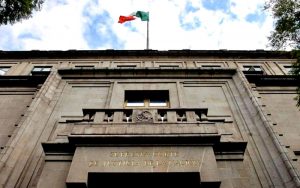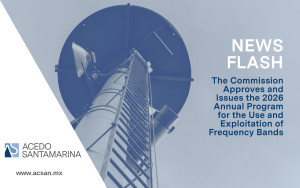
In accordance with General Agreements 3/2020, 6/2020 and 7/2020 issued during the months of March and April 2020, the Plenary of the Supreme Court of Justice of the Nation (“SCJN”) decided to decree certain measures in order to mitigate the risks associated with the COVID-19 disease, among which are to declare the days from March 18 to May 31, 2020 as non-working days.
On May 26, 2020, the Plenary of the SCJN issued General Agreement 10/2020 extending the period of suspension of jurisdictional activities until June 30, 2020, with the understanding that during said period no terms will run, however, the necessary days and hours will be enabled for the development of activities through electronic or remote means, which have the following as their purpose:
a) To rule on the suspension requested in urgent constitutional controversies, and the judicial actions that are necessary for the effectiveness of such measure.
b) The initial pleadings of matters within the jurisdiction of the SCJN are filed only electronically, through the use of FIREL or e.firma, and the corresponding electronic files must be generated.
c) Continue with the electronic processing of matters regulated in the Amparo Law, constitutional controversies, unconstitutionality actions in which laws of annual validity have been challenged or against norms in electoral matters, and appeals filed in such constitutional control means filed in the SCJN, or those filed against urgent constitutional controversies filed as of March 18, 2020, which transcend to the matter of suspension, through FIREL or e. signature.
d) Digitize the records and form electronic files in the matters mentioned in the preceding paragraph. c) above, in order for them to continue to be processed electronically.
e) Provide by electronic means the matters mentioned in paragraphs b) to d), and notifications are made by official letter, list or electronic sign, as appropriate, as well as electronically.
f) Personal notification of the summons in lawsuits filed electronically as of June 1, 2020, and by official letter to the respective authorities of the rulings admitting appeals on review or direct appeals on review, filed before or after said date.
g) Hearings and appearances are held remotely.
h) To provide for the matters listed or that may be listed for the sessions of the Plenary and the Chambers of the SCJN held remotely, to notify the rulings issued in said sessions by list or by electronic sign, and to sign the corresponding engrossments and votes electronically, and to make the draft resolutions available to the Secretaries of Agreements and Ponencias through electronic means.
i) The legislative bodies are notified of the operative paragraphs of the rulings issued by the Plenary of the SCJN, in actions of unconstitutionality or constitutional controversies in which the effects of the declaration of invalidity are subject to such notification.
j) The consolidation of matters resolved by the Plenary and the Chambers of the SCJN is concluded, prior to March 18, 2020, and must be signed electronically and notified by means of a list or electronic sign.
The deadlines to comply with the requirements ordered in the rulings issued during the month of June 2020, or to file appeals electronically against them, will restart or begin only for the party filing electronically. In the case of agreements in which an amparo on review or direct review is admitted for processing, the term for its challenge will begin as of the date of effect of the respective notification by official letter or electronic list.
The measures announced are intended to ensure that during the month of June the SCJN will conduct its activities with the necessary precautions in the face of the SARS CoV-2 virus pandemic (COVID-19).





